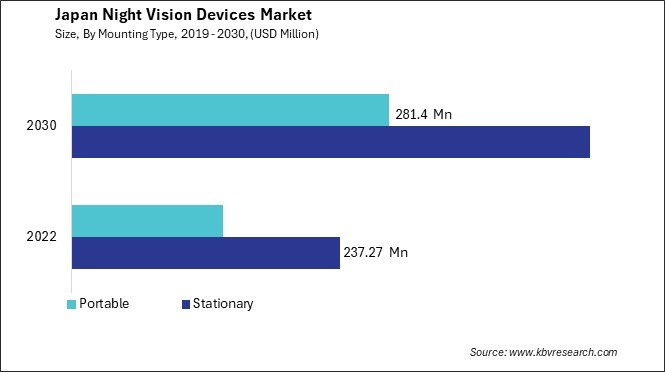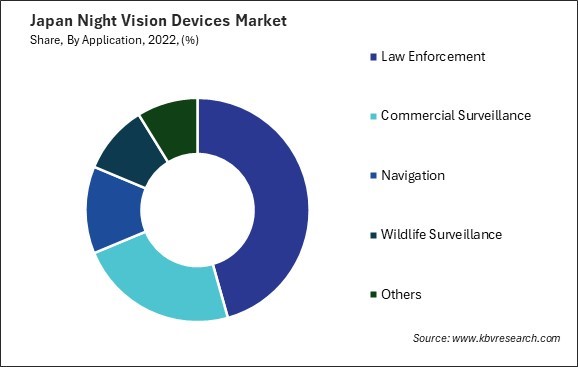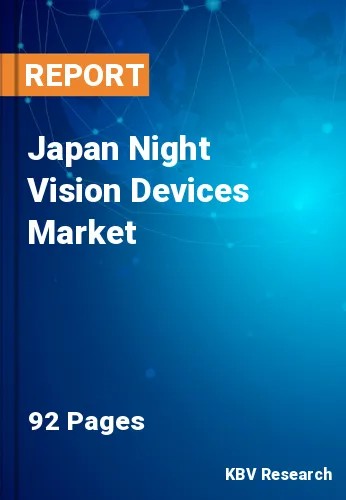The Japan Night Vision Devices Market size is expected to reach $740.57 Million by 2030, rising at a market growth of 9.1% CAGR during the forecast period.
Japan's night vision devices market has witnessed significant growth in recent years, driven by various factors such as technological advancements, increasing security concerns, and growing demand from military and law enforcement sectors. Japan, known for its advanced technological landscape, has seen a rise in the adoption of night vision devices across multiple applications. The country's defense sector has been a major contributor to the industry growth, with investments in modernizing military equipment and enhancing defense capabilities.

In addition to the defense sector, night vision devices find applications in law enforcement, wildlife observation, and recreational activities such as hunting and camping. The civilian industry segment has also witnessed growth, driven by the rising popularity of outdoor activities and the increasing awareness about personal safety and security.
According to the International Trade Administration, Japan's outdoor consumer goods industry reached approximately $4.45 billion in 2020, with the light outdoor segment experiencing consistent growth over the past three years. This sector, which encompasses activities like auto-camping and fishing, commands almost 60% of the total outdoor consumer goods industry. Similarly, the rising popularity of outdoor activities in Japan has spurred significant interest in the night vision devices market.
The COVID-19 pandemic has significantly impacted the night vision devices market in Japan. The stringent lockdown measures, supply chain disruptions, and economic slowdown have affected the production and distribution of night vision devices. Furthermore, the postponement of military and defense procurement programs and budget constraints have led to a temporary slowdown in demand from the defense sector.
However, the pandemic has also highlighted the importance of advanced surveillance and security technologies in responding to emergencies and ensuring public safety. As a result, there has been a growing emphasis on investing in modernizing surveillance infrastructure, including night vision devices, to enhance preparedness for future crises. Moreover, the shift towards remote monitoring and surveillance solutions to enforce social distancing measures has created new opportunities to adopt night vision devices in various applications such as perimeter security and crowd monitoring.
Japan's night vision devices market is experiencing a significant surge in demand for night vision scopes, driven by various factors ranging from technological advancements to increasing security concerns and recreational activities. Night vision scopes, which enhance visibility in low-light conditions, have become indispensable tools for various applications, including military operations, law enforcement, wildlife observation, hunting, and even amateur stargazing in Japan.
One of the primary drivers behind the increasing demand for night vision scopes in Japan is the growing emphasis on security and surveillance. With rising national security and public safety concerns, law enforcement agencies and defense forces are increasingly turning to advanced night vision technology to enhance their capabilities for nighttime operations. Furthermore, advancements in night vision technology have made these devices more accessible and affordable to a wider audience. Improved manufacturing processes, along with economies of scale, have reduced production costs, making night vision scopes more affordable for both professional and recreational users in Japan.
Additionally, integrating night vision technology into various consumer electronics, such as smartphones and digital cameras, has fueled the demand for night vision scopes. Japanese consumers are now more accustomed to using night vision technology daily, driving interest and demand for dedicated night vision devices like scopes. Thus, Japan's night vision scopes industry is witnessing a surge driven by heightened security concerns, technological advancements, and increased integration into consumer electronics.
In Japan, the adoption of night vision technology has been steadily rising, fueling growth in the night vision devices market. One significant driver of the increasing adoption of night vision technology in Japan is the growing emphasis on security and surveillance. With concerns over public safety and national defense, there has been a heightened demand for advanced night vision devices among law enforcement agencies, military forces, and security personnel.
Moreover, the proliferation of night vision technology across civilian applications has contributed to its rising adoption in Japan. Industries such as wildlife observation, outdoor recreation, and transportation have recognized the benefits of night vision devices for improving visibility and safety during nighttime activities. Additionally, night vision technology is increasingly integrated into automotive systems to enhance driver visibility and mitigate the risk of accidents, further driving industry growth.
According to the International Trade Administration, the burgeoning adoption of night vision technology in the Japanese night vision devices market is closely tied to the outdoor consumer goods industry, which boasts a substantial size of approximately $4.45 billion in 2020.
Technological advancements have also played a crucial role in driving adoption. Innovations in sensor technology, image processing algorithms, and thermal imaging have led to the development of more compact, efficient, and affordable night vision devices. These advancements have improved the performance and reliability of night vision technology and widened its application scope, making it accessible to a broader range of users in Japan.
Furthermore, government initiatives and investments in research and development have supported the growth of the night vision devices market. Collaborative efforts between industry players, academia, and government agencies have facilitated the development of cutting-edge night vision technologies tailored to Japan's specific needs and challenges. Hence, Japan's increasing adoption of night vision technology is driven by heightened security concerns, expanding civilian applications, technological advancements, and government support.

Japan's night vision devices market has seen significant growth in recent years, driven by advancements in technology, increasing security concerns, and the rising demand for surveillance and defense applications. One prominent company in the Japanese night vision devices market is Canon Inc. Leveraging its expertise in imaging technology, Canon has introduced a range of night vision devices that offer high-resolution imaging capabilities, enhanced low-light performance, and user-friendly interfaces. These devices find applications in various sectors, including law enforcement, wildlife observation, and outdoor recreation.
Another major player in the Japanese night vision devices market is Sony Corporation. Sony's night vision devices feature cutting-edge sensor technology and image processing algorithms, delivering clear and detailed images even in low-light conditions. These devices are utilized by both civilian and military users for surveillance, reconnaissance, and security purposes.
Additionally, Mitsubishi Electric Corporation has established itself as a leading provider of night vision solutions in Japan. The company's products incorporate advanced thermal imaging technology, allowing users to detect heat signatures and movement in complete darkness. Mitsubishi Electric's night vision devices are widely used in border security, perimeter monitoring, and industrial inspection applications.
Furthermore, Fujifilm Holdings Corporation has made significant strides in developing night vision devices tailored to the Japanese night vision devices market. Leveraging its expertise in optical and imaging technologies, Fujifilm offers a range of compact and lightweight night vision goggles and monoculars suitable for various outdoor activities, such as camping, hunting, and wildlife observation.
Hamamatsu Photonics K.K. is a leading manufacturer of photodetectors and image sensors used in night vision devices in Japan. The company's high-sensitivity sensors capture clear and detailed images in near-total darkness, making them ideal for surveillance, security, and military applications. Thus, the night vision devices market in Japan is characterized by a diverse ecosystem of companies offering innovative solutions tailored to the specific needs of consumers and industries.
By Mounting Type
By Device Type
By Technology
By Application
Our team of dedicated experts can provide you with attractive expansion opportunities for your business.

